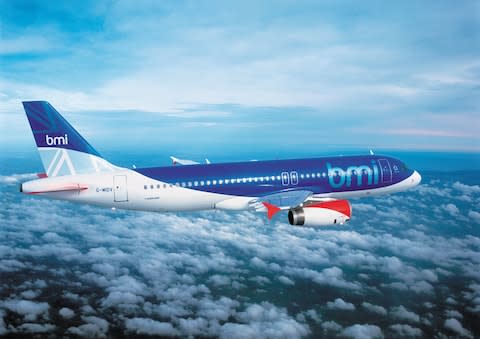Flybmi collapse: What to do if your holiday is affected

Thousands of passengers have been left stranded after their flights were cancelled on Saturday night when British regional airline Flybmi went into administration.
The privately owned East Midlands-based carrier, which operated 17 jet aircraft on routes to 25 European cities, stopped operations without warning, cancelling all of its flights and notifying customers by text message.
Even the British Airline Pilots Association were reportedly blindsided by the collapse, which a spokesman for Flybmi blamed on “the uncertainty created by the Brexit process”, along with recent spikes in fuel and carbon costs.
Its demise follows hot on the heels of other low-cost carriers including Primera Air, which folded in October and Monarch the year before. Industry experts predict it won't be the last failure of its kind.
How will stranded passengers get home?

Customers who were booked onto a return flight with Flybmi will have to purchase a new ticket with a different airline. A statement released by the carrier confirmed they were "unable to reschedule or rebook alternative flights on behalf of customers".
It advised passengers to contact either their travel agent, or one of Flybmi's codeshare partners to arrange a new flight; including Lufthansa, Brussels Airlines, Turkish Airlines, Loganair, Air France and Air Dolomiti.
The CAA has advised: "If you purchased travel insurance that may include cover for scheduled airline failure, known as SAFI, you should contact your insurer. If you did not book directly with Flybmi and purchased your tickets through an intermediary, you should contact your booking or travel agent in the first instance."
One Briton stuck in Belgium told the BBC the airline would not refund her fare and she could not afford an alternative. Durham University student Mary Ward complained: "I paid £130 for my flight which it doesn't seem I'm going to get back - I don't know how I am going to get back to Durham. I can't afford any of the flights or the Eurostar."

Will I get a refund on unused tickets?
“It all depends on whether your booking was part of a package holiday organised by a tour operator or travel agent which is licensed by the government’s Atol scheme,” explains Telegraph Travel's chief consumer editor, Nick Trend. “If it is, you are entitled to a refund.”
For the many passengers that booked their flight directly through Flybmi, there are other options. “If you paid by credit card (and the fare was over £100) you will probably be protected by Section 75 of the Consumer Credit Act 1974,” adds Trend. “You may also have similar cover if you paid by Visa debit card. Check the arrangements with your bank.”
The Section 75 cover, however, will only refund the money you paid for the original fare - it will not help you get home if you are stranded abroad. You will have to pay for a new flight. It is also worth noting that an estimated 60 per cent of travel insurance policies do not offer protection against airline failures (and those that do often charge extra for it).
What will happen to Flybmi's routes?
Loganair, Flybmi’s sister company, has already stepped in to save five routes and signalled that it could secure more. Loganair announced on Sunday that it will take on routes departing from Aberdeen to Bristol, and to Oslo, Norway, and Esbjerg in Denmark.
It has also claimed flights from Newcastle to Brussels and to Stavanger in Norway. Services will not commence until March 4 at the earliest.
The carrier could also save the Government-subsidised service from City of Derry airport in Northern Ireland to London Stansted. Elsewhere, Bristol Airport confirmed that it will "enter into discussions with a range of airlines to replace these flights".

Why did Flybmi collapse?
Flybmi’s management pointed the finger at Brexit uncertainty and rising oil prices, stating: “It is with a heavy heart that we have made this unavoidable announcement today.
"The airline has faced several difficulties, including recent spikes in fuel and carbon costs. These issues have undermined efforts to move the airline into profit.
"Current trading and future prospects have also been seriously affected by the uncertainty created by the Brexit process, which has led to our inability to secure valuable flying contracts in Europe.
“Additionally, our situation mirrors wider difficulties in the regional airline industry which have been well documented.”
Aviation analyst John Grant told Telegraph Travel: “There are perhaps too many airlines in Europe today relative to the size of the market, with too many struggling to keep market share. In the United States, five major airlines provide some 80 per cent plus of scheduled capacity and that may be where the European market will head over time.”

Was the writing on the wall?
Very much so. Back in October the chief executive of EasyJet, Johan Lundgren, predicted that high oil prices would lead to the collapse of more scheduled airlines. This, and the general economic and political uncertainty over the past few months, combined with cut-throat competition from rivals such as EasyJet and Ryanair was indeed enough to put Flybmi out of business.
This collapse means 29 carriers have now been lost since the start of 2017, with Air Berlin and Cobalt Airlines among the most high profile. Other carriers, meanwhile, are looking wobbly. Flybe, up for sale since last November, was bought by Virgin last month, and has one of the industry’s worst passenger load factors.
Flybe was quick to reassure customers, however, that it was business as usual following its rival's collapse, tweeting: "We are very sorry to hear about the situation with the competing British regional airline Flybmi and our thoughts are with their employees during these difficult times. Flybe has nothing to do with Flybmi and our flights continue to operate as normal."

What other airlines are struggling?
Wow air has been forced to scrap many of its long-haul routes and in January sold a 49 per cent stake to a private equity company, while Norwegian has posted some pretty staggering losses (£180m for 2016 and £352m for 2017).
Thomas Cook, too, has seen its shares plunge in the last year after swinging to an annual pre-tax loss of £53m. It admitted that its airline could be sold following a strategic review of the company.
These are tough times for the European airline industry. Even Ryanair - the second largest airline in Europe - isn't safe. In January, the Irish carrier set off alarm bells by issuing a second profit warning in four months.
CEO Michael O’Leary admitted that earnings would be lower than expected as it slashes air fares to protect its market share. Ryanair has also faced higher costs from staff walkouts amid a prolonged battle with pilot unions.
"We believe this lower fare environment will continue to shake out more loss-making competitors, with Wow, Flybe, and reportedly Germania for example, all currently for sale," he told investors last month.

What more can be done to protect passengers?
In short, it’s a mess, which is why, for many years now, Telegraph Travel has been calling for passengers with scheduled airlines to be better protected. It has become one of the main strands of our Safer, Fairer, Better campaign.
There are some signs of movement from politicians. In the wake of the Monarch collapse the Government finally announced a review of the problem of how to protect airline passengers. But, more than a year later, it is still underway.
Jesse Norman, Minister at the Department of Transport said last November: “Publication is expected in the coming months. Once the report is published, the Department will consider the recommendations of the review and take steps accordingly to ensure a strong level of protection for consumers in the event of airline failure, with minimal impact to the taxpayer.”
“Personally,” says Nick Trend, “I’m living more in hope than expectation.”


